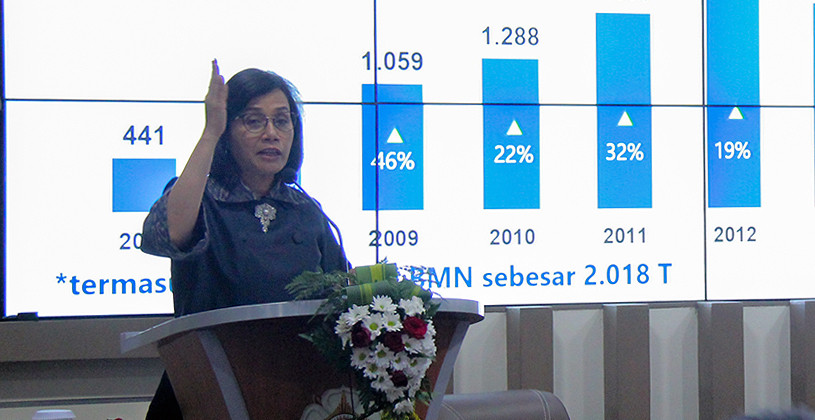State-Owned Property Management: Reflection of Nation’s Civilization
- Details
- Written by Wheni
- Category: News
- Hits: 1991

On Tuesday (25/9), FEB UGM held a public lecture on 8th floor of FEB UGM’s Learning Center building in the Auditorium with the theme of "Strategies for Optimizing State-Owned Property (BMN) Management in Fiscal Policy Management" as the series of the 63rd FEB UGM’s Dies Natalis. The speaker of this public lecture is the Minister of Finance of Republic of Indonesia, Sri Mulyani Indrawati, S.E., M.S., Ph.D., in which she conveyed the important of state-owned properties management for Indonesia.
In the public lecture, she said that state-owned properties were often considered as insignificant, whereas according to her, state-owned properties were country assets that required a good planning, management and maintenance. Furthermore, she said that the topic of state-owned properties management was one of her interest because through the way a country managed it, the civilization of a country could be identified.
"Why the topic of state-owned property is my favorite? State-owned property reflects how civilization of a country. It is also able to reflect the country’s ability in planning properly and to present how the ministries and government institutions are able to execute the development of economic properly,” said Sri Mulyani. “Furthermore, this is able to reflect the civilization of a nation in taking care of what has built by the nation. In addition, we can acknowledge the nation’s attitude values and attitude characters through state-owned properties,” she added.
According to her, Indonesia is currently still unable to optimize the usage and maintenance of state-owned properties. At the moment, the government has only focused on the development of the country, there is not enough attention about the maintenance of state-owned properties yet.
Sri Mulyani gave an example of Indonesia condition in The New Order where there was no bookkeeping for state-owned properties, thus it can be seen that the government at that time still did not care about the condition of state-owned properties. In 2004, the government started to require bookkeeping for state-owned properties, although the Audit Board of Indonesia (BPK) issued disclaimer of opinion report. However, according to Sri Mulyani, it was a good step to improve Indonesia's state-owned properties arrangement system. Through a relatively long process, in 2016, bookkeeping of state-owned properties began to obtain an Unqualified (WTP) of opinion report by BPK.
Beside of maintenance, Sri Mulyani also emphasized the need to optimize the usage of state-owned properties. According to her, country assets should have maximum usage values. The principle of asset optimization must be applied. She conveyed that state-owned properties were indeed country assets used for the government. However, when the assets were not used by the government, it can be employed for other usage, so the assets worked continuously and sustainably gained more usage value.
Sri Mulyani also criticized the usage of assets that are still considered exclusive or not optimal. She suggested to conduct open space practices, or the usage of asset for public community, so that optimization the usage of state-owned properties will occur. At the end of her presentation, Sri Mulyani once again conveyed to all audiences, including the Rector of UGM, the Dean of FEB UGM, the Directorate General of Taxation, and all Bachelor and Postgraduate students, that state-owned properties management is important because our country's civilization can be reflected from it. And especially, she said that FEB’s students should have a good knowledge about balance sheet, “if FEB’s students do not have a good understanding about balance sheet, it means that you are not qualified yet,” she ended it.
Sumber: Erma Wheny


